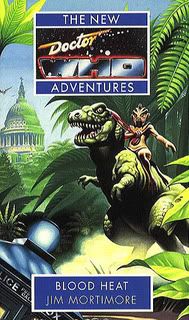
Blood Heat by Jim Mortimore
In Brief: The TARDIS is attacked by an alien force; Bernice is flung into the Vortex; and the Doctor and Ace crash-land on Earth. However this is an Earth that has been ruled by the Silurians since they killed the Doctor 20 years ago...
I'm not quite sure how I feel about Blood Heat. I know that I've been accused in the past of not being obvious in regards to if I like/don't like something (unlike when I have a severe hate-on, then you all know about it) but I can't rise above a sense of ambivalence about this book. It wasn't bad, the writing and characterisation is good but there's just a sense of something missing. That something possibly being a plot. As with Jim Mortimore's earlier co-authored Lucifer Rising the book is more interested in exploring a locale than telling a story. While there's no reason such a novel can't work there a few things that get in the way of that happening here.
First is the actual setting, or namely that it's not very interesting. What seems to be a parallel Earth actually turns out to be a sub-Universe that has been created by an as-yet-unknown something or someone in order to trap the Doctor (which will run through the next few novels in the series). Blood Heat takes place after the Doctor has somehow been killed during the events of the televised 1970 story Doctor Who and the Silurians (yes, that's what it's called). With no Doctor to stop their plague in that story humanity has been almost destroyed as the original masters of Earth terraform the planet back to the Jurassic.
So this is a "what-if" scenario as we have the Doctor and Ace (Benny is missing for almost the whole book) meeting a human resistance led by the UNIT "team" of The Brigadier, Liz Shaw and Sergeant Benton.
Jo Grant also shows up, but is feral after being hunted by the Silurians for 2 decades.
Using these old characters is probably why the book felt a bit hollow. Rather than going somewhere new the book does a retread of older Who, albeit in altered form. Also I realised there's very little description or context given to The Brig or Liz, the novel expects the reader to know already know the characters and their relation to each other. This made sense back in 1993, when this book was published, since in the same year we had the original 1970 story released on VHS as well as the magazine having several months of a Silurian-related comic strip. With it being the show's 30th-anniversary at the time this rehashing of the past was very deliberate. However now in 2010 expecting an audience to automatically know the set-up of a previous era of the show just wouldn't happen.
That's probably a good thing. If any lesson can be learned from the mess that was the mid-80s it's that Doctor Who shouldn't ever get too bogged down in the past.
And if only Star Trek would have learned that lesson there might still be some form of that show on TV. And Enterprise wouldn't exist.
Another factor which makes Blood Heat feel a bit off is that with it being very much based on the earlier Silurian tale it's imbued with that story's oddness. "Doctor Who and the Silurians" is (I think) the only serial that completely follows the "exiled on Earth" format they tried in the early-70s with the Doctor working for the military/UNIT. There's no mention or appearance of the TARDIS or the fact that the Doctor is an alien. And with the Silurians actually being older inhabitants of Earth it technically doesn't even have aliens in it. Also Liz Shaw is in many ways a "companion" like no other. Originally intended to me more of an equal to the Doctor she takes a very active role in all of her stories, although never actually steps foot in the Tardis.

But being smart didn't mean she couldn't wear mini-skirts that Amy Pond would find short.
She's not well remembered since as well as only lasting a single season a new producer decided the show worked better with a less-mature female character who would be more prone to get into trouble/trip over twigs (and need saving). Hence Jo Grant.
Although the mini-skirts remained.
In Blood Heat Liz takes centre-stage, being the moral centre for much of the book especially in trying to stop this alternative bloodthirsty Brigadier from trying to nuke the Silurians. I seem to remember that at the time the character was showing up a lot in Who-related fiction. I suspect this is probably due to a lot of people making the books/comics/what-not at the time were trying to move away from Doctor Who as being "that silly kids show" so embraced Liz and her more equal-to-the-Doctor ways. As if being "silly" is what had taken the show off of television.
So with the early-70s UNIT trappings Blood Heat feels like a throw-back to that more "serious" pre-Jo Grant time of the show. But because we're so obviously in "what-if" territory and there will obviously have to be a big reset at the end to get things "right" it means that it was hard to really feel involved with events. Thankfully Mortimore is able to somewhat overcome this problem with some very good characterisation and also by keeping events fairly interesting, barring one or two unneeded action scenes.
I realise that I'm sort of circling actually analysing the book itself; the problem is that there's not really a whole lot to discuss. The only things that really *happen* is that the Tardis crashes/breaks-apart at the beginning and then plunges into a tar-pond (then the Doctor takes over the 3rd-Doctor's alternative Tardis rather than retrieving the original. Don't ask.) and after a lot of wandering around a ruined London there's a missile scare at the end as the Brigadier tries to destroy the Silurians (while is all resolved by...the Doctor flipping some switches. Some things never change.). Again thankfully Mortimore has enough skill as an author to keep the setting interesting, particularly in showing an England devastated by plague and being taken over by primeval jungle. Although he does get a bit heavy-handed at times with the moralising. Also the ending is quite poor as the book becomes all follow-up and no resolution (or rather an extremely brief resolution). The entire alternate-Earth is "corrected" by the Doctor fiddling with the Tardis a bit, which basically negates everything that happens over the previous 250 pages.
But the BIG problem is that (even moreso than Iceberg) the book is completely based on assuming that the reader has seen or knows about an older story. While earlier uses of continuity have been annoying this is the first time that an entire book has been so reliant on it. Blood Heat is the series trying something different but for the first time it's not in a good way. It's all just too caught up in the past to work. The funny thing is that I remembered really liking this book at the time, but then that was a world where the show had been off the air for over 4 years.
While other books have had some trappings of being from the early-90s this is the first time (well, Timewyrm: Genesis I think may have the same problem) that I've come across a book which *only* could have worked in 1993. It's definitely not a bad novel (and after crap like Deceit and Shadowmind believe me I know bad novels) but it's just aged very poorly after 17 years.
But that's saying something that this is probably the first time I've really run into that problem after almost 20 books.
And despite not being great it's still the best use of the Silurians since 1970, this year's 2-parter included.
No comments:
Post a Comment